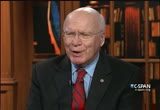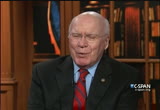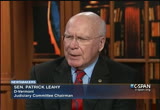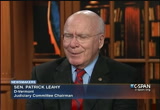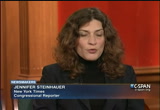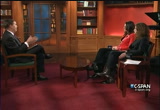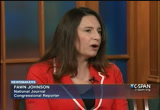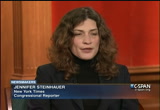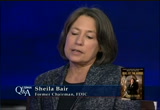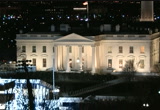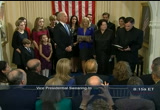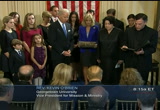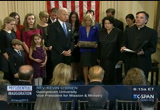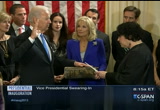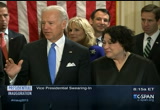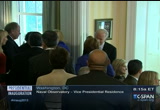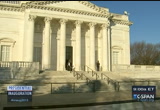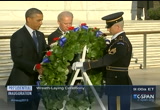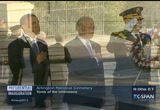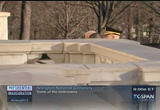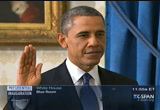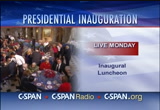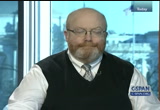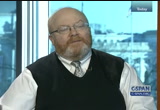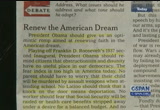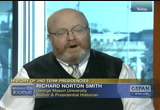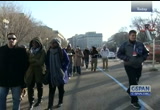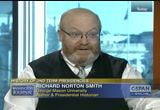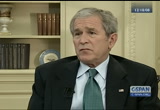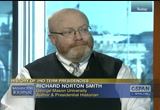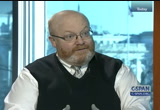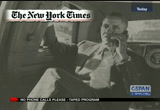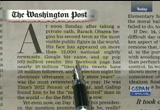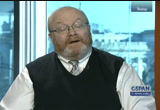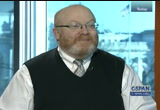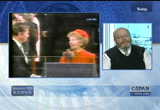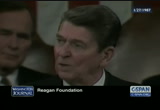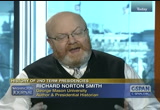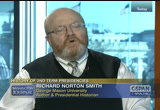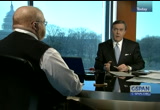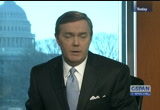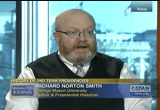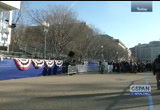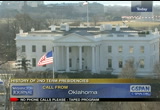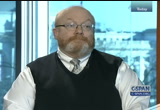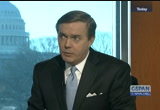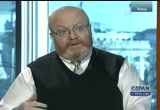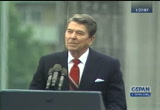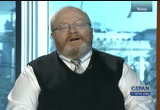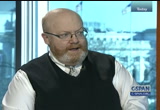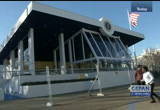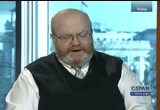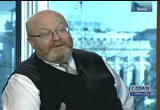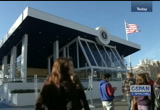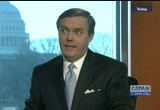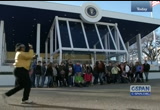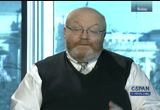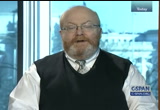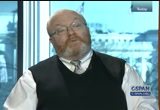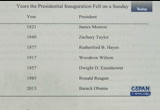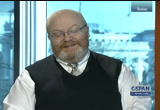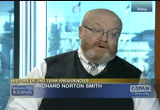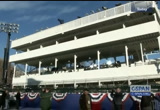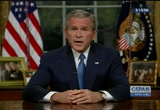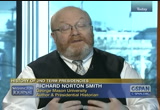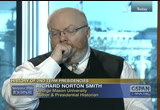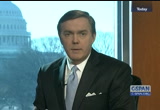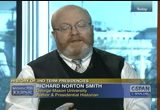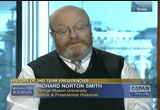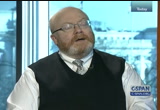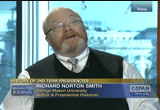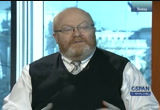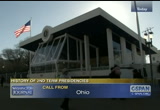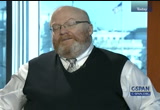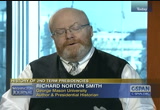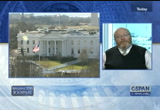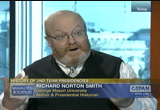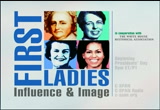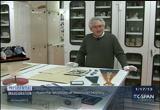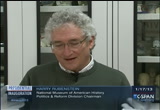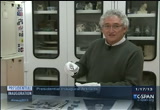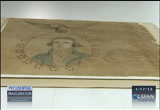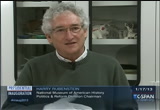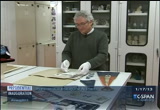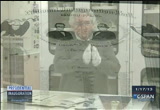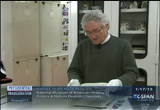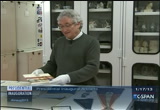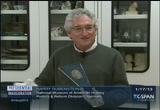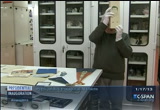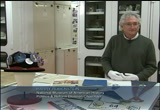tv News Public Affairs CSPAN January 20, 2013 6:30pm-8:00pm EST
6:30 pm
even more for his safety than i did before. i got a letter from the president addressed to me as "dear mr. president." there are certain aspects to it. it made me suspect in that you have been in the senate a long time. think of what has worked and what has not worked. what can i do to make it work better? i may write a book on this. >> what is the title? >> i do have photographs of behind the scenes over 30 some odd years. >> what would be the lesson? >> stop thinking about what
6:31 pm
advances you instead what advances the country. people look at it as a sprinter group. i have to advance them so they advance me. no. >> what is the greatest hope? >> i hope we will stop these endless filibusters. i would hope a lot of the things we used to do as routine will go back to that so we can debate real issues. we should have a real debate on
6:32 pm
immigration and our overall budget. i am the senior member of appropriations. let's have a real debate on that. look at what just happened in the house. we had something that cost nothing. we put in a provision that allowed the state department to take money already appropriated for them and to move it into security. the house had several hearings on this. what did the house do? they cut it out. that makes no sense. you cannot say we do not have enough embassy security and the next day say even though the money is there we will not let you spend it.
6:33 pm
we need to be more responsible. >> patrick leahy, thank you for being with us. >> we continue conversation with fawn johnson and jennifer steinhauer. >> what is the moment you will remember? >> he expressed frustration about the gun hearings he's about to hold. it reflects the difficult position that he is in and the dynamic of the entire democratic caucus. there are a lot of members that come from red states or have a very moderate, pro-gun record. he is in a tough spot himself in terms of protecting and
6:34 pm
working with his members who are concerned about going too far or doing anything on guns. and also as regarding his role as chairman. he mentions decisions had to go through his committee. dianne feinstein is running an assault weapons bill. she's about to introduce it. other members are interested. he wants to be associated with and control this process but he has to work very carefully. >> you wrote about this about the devil will be the details. >> what is an assault weapon? how do you define it? this is not a surprise, the
6:35 pm
kinds of questions i am asking, will not be answered immediately. these are the things you have to deal with to put the legislation through. he talked about hearings not legislation. hearings are wonderful way of getting ideas out. when the devil starts to come up as they go into markup the legislation. that can be very painful. it seems the gun show loophole is a perfectly good way to go forward. >> we hear the nra described as powerful and influential. just how powerful? did newtown change the dynamic? >> they will continue.
6:36 pm
there is a shorthand used with the nra. americans to support second amendment rights do so because the nra tells them to. the nra is interested in building their membership. they are not dictating thought to people. people care about their guns. there is a component that goes on between the nra and lawmakers. that relationship is more nuanced than is often portrayed. i would think the nra would push back on any attempt to renew an assault weapons ban. they have been more silent on
6:37 pm
the background check. >> thank you both for your questions and being with us on "newsmakers" today. [captioning performed by national captioning institute] [captions copyright national cable satellite corp. 2013] clacks why did you write a book about your experience? >> it was an important point in history. i thought like the perspective should be brought. i thought it was not completely accurate, about in terms of what i did and what we did. i thought it was important for the historical effort to put that in perspective. also, i think for people to understand that there were different policy choices, different options. and if we want to prevent this crisis -- another crisis from happening again, i thought that the public itself needed to engage more on financial
6:38 pm
reform, educate themselves better. i tried very hard to make the book accessible. i hope people will look and take it seriously. >> on the government's role during the country's worst financial crisis since the depression. her book is "bull by the horns" tonight on c-span's q&a. >> after that, president obama and by its -- and vice president biden had a wreath-laying and president obama took the oath at the white house. here is a look at the events today.
6:39 pm
6:40 pm
you have been told, mortal, what is good, and what the board requires a view, only to do justice and love goodness, walking calmly with your dog. -- god. gracious god, we ask your blessing on your servant, joseph, as he renews the pledge he made to his country. in all the complexities that, this world, give us your wisdom so that he can know what is good and give him the courage to always do what is right. walk close by him so that he can do justice and labored tirelessly for a more just and gentle world. empower him to be a voice for those without a voice. for those on the margins, so easy -- easily overlook, you will judge us all for how we care for those among us.
6:41 pm
continue to give him the humility to call upon him in times of need and with the gift of faith given to him by his church and family, help him to always know of your presence. lord, protect our president and vice president in their service to assault. -- to us all. we thank you for the blessings of peace and liberty. we honor the sacrifices of so many in our foreign service and civil service, to safeguard these blessings daily. we renew our pledge how as citizens to join them in that noble labor, to always work for the common good and help us to set aside self-interest and meet one another on the common ground to which you call us. q, generous god, have given us so much. we humbly offer these gifts for the good of others and how the greater glory, amen.
6:42 pm
>> mr. vice-president, are you ready? >> i am. >> please repeat after me. i, joseph r. biden jr. do solemnly swear that i will support and defend the constitution of the united states. [repeats] against all enemies foreign and domestic [repeats] then i will bear of faith and allegiance to the same and take this obligation freely without any mental reservation or purpose of evasion. [repeats] i will well and faithfully discharge the duties of the office of which i am about to enter
6:43 pm
repeats] so help me god. [repeats] >> congratulations. [applause] >> thank you. [applause] >> madam justice, these as some of my friends. [laughter] i want to explain to you what a wonderful and honor it was, how much out of her way she had to go. she is due in new york and has to leave right now. i apologize, we will walk out to her car, waiting, so that she can catch a train if i have not caused her to miss it.
6:44 pm
i am going to meet the president in the traditional laying a wreath at the tomb over at arlington. i will be back, they tell me, in 40 minutes. i hope that some of you will still be here. i thank you very, very much for sharing this moment with my wife and i. madam justice, it has been a great honor. thank you. [applause]
6:49 pm
>> please raise your right hand and repeat after me. >> i, barack hussein obama, do solemnly swear, that i will faithfully execute the office of president of the united states, and will to the best of my ability preserve, protect, and defend the constitution of the united states, so help me god. >> congratulations, mr. president. >> thank you, mr. chief justice. thank you so much. thank you, sweetie. hey, thank you.
6:50 pm
>> good job, dad. >> i did it. >> you didn't mess up. >> all right. thank you, everybody. >> this weekend, the 57th presidential inaugural address as president obama begins his second term. live, shortly before noon eastern. our coverage include your phone calls and begins with a look back at the 2009 inaugural address. and then monday, the swearing in at noon eastern at the u.s. capitol and other festivities, including the luncheon and the afternoon parade. live, all day coverage begins on c-span and throughout the day,
6:51 pm
join the conversation by phone, on facebook and on twitter. >> the route inauguration day, our web site will have the added features, including the video feed from our c-span crews and a visual blog page of behind-the- scenes of photos. now, a discussion about the second terms of u.s. presidents. from washington journal, this is just under one hour. host: we want to welcome author and historian richard norton smith. thanks for being with us. the most memorable second term address was by abraham lincoln. guest: people think that it outranked the gettysburg address.
6:52 pm
i would say it is the greatest lay sermon delivered in america. anyone who questioned his spirituality, read the second inaugural. it is a remarkable address. it is not a celebratory speech. at that point, the war is almost over. the most obvious thing to do would be some congratulations. host: with malice toward none. guest: that is the magnanimous side. until the crime of human slavery was removed from the american landscape, the united
6:53 pm
states would not be right with god. it is an extraordinarily spiritual address. lincoln was looking ahead to reconstruction. host: this morning in the "new york times," the historian one of a number of people offering advice for the president's second speech. guest: i would not offer advice to the president. the second inaugural is one of the more inaugurable addresses.
6:54 pm
i see a country one-third ill clothed, ill fed. host: as the author of the book "patriarch," he delivered the first second inaugural address. is it inaugurable? guest: he had a thin skin. he was not accustomed to the kinds of press attacks he was experiencing. he did not want to run for a second term in the first place.
6:55 pm
he was talked into it. it is the shortest inaugural address on record. 200 words. it was in philadelphia, which was in the capital. basically called god to witness. if he failed to live up to the oath he had just taken, there were be punishment for that. it was a strange speech. very personal, very revealing. host: richard norton smith has written a number of books. he is now working on a new book on vice-president nelson rockefeller. guest: they had a number of parties there, christened the house.
6:56 pm
host: also affiliated with george mason university. we have now had a period of a number of second term presidents. reagan, clinton, and bush. guest: this is the second time in our history when we have had three successive two-term presidencies. three men going to their second inaugural in a row. the only other time that happened was in the 19th century. jefferson, madison, and monroe. you're right. it is an interesting counterpoint to the polarization we talk about. host: i want you to listen to an interview we conducted on
6:57 pm
december 18, 2008 with outgoing president george w. bush. listen to what he said, also his body language. [video clip] >> you said, i am optimistic that we can change the tone in washington. >> that was a hopeful person saying that. >> are you less hopeful? >> we work together, there were some bipartisan accomplishments but the rhetoric got very tough.
6:58 pm
some people here in this town use the politics of personal destruction to advance their agenda. i do not want to sound self- serving, but i have not. i do not think a president should. i was hoping for better tone, and it did not happen. host: as you reflect on george w. bush at the end of his two terms. guest: president obama has said things better very similar. it is not just about washington. washington is a reflection of a broader culture. we live in a polarized culture. we live in a culture that celebrates -- notoriety is the quickest ticket to 15 minutes in the 24 hour news cycle. the other enormous difference that contributes to this -- i do not know how you reverse it.
6:59 pm
7:00 pm
caller: i am concerned about how history is going to deal with the fact that the senator mitch mcconnell and the senate and house republicans all stood up and said, we're going to stop this presidency. we're going to make sure it is a failed presidency. how is history going to deal with that? why has the press and the media given republicans a pass on this serious issue? it is almost like it is unpatriotic, totally unethical for them to do this. guest: it reflects the evolution of the political culture. he used to say, i am a man of unyielding principle.
7:01 pm
and i am a man of unbending flexibility. it is a reflection of this political culture, which is along the lines i just described. host: i want to read you from "the washington post." barack obama begins his second term as the most visible public figure in the world. his face has appeared on more than 12,000 nightly newscasts. pops 952is name and up op results.
7:02 pm
pages has nearly 35 million "likes." ow, the question persists -- who is he, really? there is a common refrain that obama seems elusive, if not mysterious, less easily categorize and understood than the last democratic resident. -- president. your thoughts? guest: because it is an important point -- the first part of what you read, the extraordinary visibility, the immediacy, the fact the president -- 500 years ago, presidents were names in newspapers. they were not vivid to people. they did not come into our homes in the way the modern president
7:03 pm
does. it happened to ronald reagan, it happened to bill clinton, george bush. and that is, obama fatigues. three years from now, people will be writing columns about obama fatigue, just as they did about clinton fatigue and bush fatigue and reagan fatigue. franklin roosevelt only gave 30 fireside chats in 12 years. he understood instinctively the dangers of overexposure. he also controlled the media to an extent that modern presidents could not hope to. host: looking back, fdr broke the unwritten code of serving more than two terms. he was elected to four terms.
7:04 pm
in today's modern age, could we have more than two terms for any president? guest: great question. >> you worked for ronald reagan. if his health was better, of course, would he have run for a third term? guest: i doubt it. he talked about it after he left office. he was going to campaign for appeal of that amendment. he thought the american people should be able to vote for anyone wanted to vote for. it is very difficult to imagine after eight years of office -- we've used up our presidents. that is why this string of two- term presidents is really so unusual.
7:05 pm
we have a string of one-term presidencies before that. that became the norm. host: let me share with ronald reagan said in january of 1987. state of union address. there was the iran-contra sc andal. [video clip] >> i have one major regret. i took a risk with our action in regards to iran. it did not work. for that, i accept full responsibility. it was not wrong to try to save lives. certainly, it was not wrong to try to secure freedom for our citizens held in barbaric captivity. [applause] but we did not achieve what we wished, and serious mistakes were made in trying to do so. we will get to the bottom of
7:06 pm
this. i will take whatever action is called for. host: a look at second terms, nixon and watergate and the iran controversy with ronald reagan. guest: it is like the second term curse. fdr coming off the greatest victory in history stumbled badly when he tried to pack the supreme court, and tried to purge conservatives in the south from democratic primaries. you could argue lyndon johnson interpreted his mandate in 1964 as a blank check in vietnam. that is one of the great dangers that confronts presidents. i do not think there is a second term curse. i think there are a number of factors.
7:07 pm
i think the word "mandate" should be removed from the white house dictionary. in a polarized area, presidents have a tendency to over- interpret. the mandate they have been given. that is the great danger. host: let me add this iconic photograph of president bill clinton, hugging monica lewinsky. only the second president to face impeachment. guest: there will always be an element of what if with the clinton's second term. we have been told by people who should know that president clinton was willing to use some of the political capital he had. he won a significant, decisive victory over bob dole in 1996. he was prepared to move on entitlements, the so-called
7:08 pm
third rail of american politics, which would have required him spending a lot of political capital. then when the whole scandal broke, that was no longer a viable option. host: let me share with you this story from "the washington post." denis mcdonough is expected to be announced the next chief of staff. there is one sentence from this article i want you to react to. mcdonough is seen as an obama true believer who wants to keep an eye on burnishing his legacy. guest: i think the press maybe has a tendency to exaggerate a little bit, the tendency to say that second terms are all all about legacy.
7:09 pm
the very moment you are celebrating whatever mandate you have for reelection, you realize you're also a lame-duck. in this town, that means with every passing day you have that much less power and influence. presidents in their second term have a very narrow window of opportunity in which to achieve big things. that is what makes this year so significant. host: we welcome our radio listeners. we're talking with author, historian richard norton smith. the cover story of "christian science monitor" - a look inside as some of the more famous second terms richard norton smith is talking about.
7:10 pm
vietnam was lbj. a call from the bronx, new york. caller: if the losing presidential candidate is not an office holder, does he get to participate in the inauguration? will mitt romney be there? host: we know that mitt romney will not be here tomorrow, neither president bush. guest: president bush 41 is just out of the hospital. i wonder if jimmy carter -- host: he will be in attendance, as well as bill clinton. immy carter is 87.
7:11 pm
-- jimmy carter is 87. guest: that is a relatively new tradition. herbert hoover was invited to the kennedy inaugural in 1961. he was a very close friend to the president's father. the weather was so bad that he really could not get here. but he intended to be here. host: ronald reagan had the warmest and coldest inauguration days. 1981 and 1985. guest: the great story about the weather -- william howard taft, who had this self deprecatory sense of humor -- there was a blizzard. he said, i always thought it would be a cold day when i would be elected a president of the united states.
7:12 pm
speech?ow long was his guest: almost two hours. there have been efforts recently to debunk the direct cause and effect. i do not know they have been successful. host: a caller on our independent line. caller: i want to bring attention to george washington's first inauguration. it was at a little church called st. paul's chapel. that is where george washington adjourned congress during the inauguration, to go down there and pray. during that prayer meeting, george washington asked for the blessings of god. the little chapel is located on the same territory where the
7:13 pm
world trade center was destroyed. i thought that was interesting, because washington said if we ever turned our back on god, god would lift his hand of protection and prosperity from this nation. just a few years ago, washington's monument there was damaged so badly that we can no longer go into it. do you know where his second inauguration was? guest: congress hall, in philadelphia. you can visit it. host: under article 2, section 1 of the constitution, the oath of office is listed in the constitution. "so help me god" is not. guest: that's right. they're still arguing about whether george washington said it or not.
7:14 pm
various eye witness accounts. a bunch of people report the same event. no two people report exactly the same. host: calvin coolidge was sworn in in 1923 and had a second ceremony just a few blocks from the white house at the willard hotel. our guest is richard norton smith. we're looking at presidential second terms. one of the issues remembered by ronald reagan was dealing with the soviet union. explain the political situation in washington, d.c. that he was facing. guest: people who think of the reagan second term within the
7:15 pm
broad definitions of the curse, they refer to it asiran-contra. but also comprehensive tax reform, the elimination of an entire class of nuclear -eapons.-- refer to it as iran contra. but also comprehensive tax reform, the elimination of an entire class of nuclear weapons. reagan and his first term had spoken about the evil empire. one thing led to another. there had been no discernible progress. i do not think many people on january 20, 1981 would have anticipated ronald reagan's greatest historical accomplishment would be significant arms control. not just slowing the rate of increase in nuclear arms, but
7:16 pm
actually doing away with the whole class in what became known as the inf treaty. host: a speech in june of 1987 in berlin. [video clip] >> we welcome change and openness. we believe that freedom and security go together. the advance of human liberty, the advance of human liberty can only strengthen the cause of world peace. there is one sign that the soviets can make that would beunmistakable, that would advance dramatically the cause of freedom and peace. general secretary gorbachev, if
7:17 pm
you seek peace, if you seek prosperity for the soviet union and eastern europe, come to this gate. mr. gorbachev, open this gate. mr. gorbachev, tear down this wall. [applause] host: why was that speech so important to his presidency? guest: that was vintage reagan. reagan going to the heart of the matter, using plain language. anyone could understand it. what he regarded was the moral issue involved, but it coexisted with this desire to find a peaceful path to coexistence. we do not know to this day -- we may never know all of the
7:18 pm
influences, all of the factors that shape the reagan's attitude, evolving attitude towards the soviet union. i would not underestimate the role of nancy reagan, who was the ultimate protector about his legacy and who wanted that legacy to include the role of peacemaker. host: as the head of the reagan library, you had a chance to sit down with former president ronald reagan in the early 1990's. how did he reflect on this time in office? what do you remember in your conversations with him? guest: he loved to tell stories. he did not tell a lot of washington stories. he told lots of hollywood stories, lots of dixon, illinois stories.
7:19 pm
after his illness was diagnosed, you could almost measure his progress because the repertoire of stories narrowed. at the end, i am told he would still talk about -- the thing he was proudest of was a lifeguard in dixon, illinois saving 77 lives. .hat stayed with im lonhim host: caller from silver lake, illinois. caller: i have a few comments to make. hello? host: you're on the air.
7:20 pm
guest: all this time, there is a split in the united states on political parties. why is it that we have such a big divide? i do not see any future of obama trying to get with the other party. he wants to heckle them, probe them like you would a mad cow or lion. this is going to bring war to the country. host: is it more partisan than it has been in the past? guest: what is different is how it feels. you cannot escape it. the nature of cable tv, which is enormously significant disproportionate to its audience in studying the tone for the debate. talk radio, the internet. these are all means of communication that saturate and
7:21 pm
reinforce and exaggerate our differences. it is all about conflict. i think that as much as everything else contributes to the sense that people have that we are more divided than we have ever been before. george washington and john adams, a mob gathered outside washington's homa, denouncing his neutrality. there have been other times. now there is no escape.
7:22 pm
host: we're looking at the veterans affairs secretary. the military, department of defense playing a big role in tomorrow's ceremony. guest: dwight eisenhower took very personally nixon's defeat. he said he knew how the condemned man felt, watching the scaffolding being built. host: people are talking about vice president biden in 2016. is that the measure of a successful presidency? guest: it is, but history argues that the last time that happened -- andrew jackson was able to install martin van buren.
7:23 pm
arguably, americans were voting for a third reagan term albeit kinder and gentler. host: there is a story that goes with that with nancy reagan. guest: i'm sure there is. one of the problems for the first president bush was, he spent the first four years with the true reaganites looking over his shoulder. it complicated his political life. host: during his acceptance speech in 1988, he talked about a kinder, gentler nation, nancy reagan said, kinder or gentler than what? that is how the story goes. [laughter]
7:24 pm
a caller from hastings, england. this program is carried live on the bbc program. welcome to the program. caller: the speech that in winston churchill made, i want to quote part of that. it relates to what the gentleman has just been talking about, technology and changes and the way people are influenced by technology. it said, "the stone age may return on the gleaming wings of science, and what might now shower immeasurable material blessings upon mankind, may even bring about its total destruction." i think he is talking about the weapons and guns we have now, also the attacks that hackers could make about the defense of
7:25 pm
america. if they did dysfunctionize the whole system, what would happen with all the gun-holders in america? if you want to get food from the supermarket, what do you do? no one seems to look at the downside of it and reasoning what it does. that is all. host: thanks for watching us from great britain. guest: i think there are lots of folks who are surprised at the pace of technological change. host: part of a cover story,
7:26 pm
looking at the president's second term, this focusing on foreign policy and and domestic issues. the obama doctrine calls for ending america's wars, avoiding future ones and nationbuilding here at home. good ideas all. but, mishandled, they could signal a retreat from washington's global leadership. the president is facing a $16, $17 trillion debt. he is facing a pullout from afghanistan and our role in the world. guest: it is interesting. leadership, what does that mean. if you go back on the eve of the world war, the number of foreign military installations the
7:27 pm
united states had, compare that with today. it was well under 100. the cold war has had an enormous transforming impact. dwight eisenhower cited all of this in his famous farewell address. i think there is a legitimate debate to be had over what is -- that is as old as the republic. washington's generation believed united states would be an asylum for the world's oppressed. it was a place to which victims could come and enjoy the fruits of liberty. there was no sense that we were going to impose our vision or
7:28 pm
values on the rest of the world. host: this question, in case you missed earlier. why is the president having two swearing-in ceremonies? does this have president in history? it does. according to the inaugural committee, it has happened on six previous occasions. 1821 with james monroe. 1849 with zachary taylor. 1877 with rutherford hayes. 1917 with woodrow wilson. 19 seven with dwight eisenhower. 1985 with ronald reagan. one today at the white house, one tomorrow at the capitol. guest: it was at the height of the war.
7:29 pm
his health was failing. they did away with most of the pomp, and had the ceremony on the grounds of the white house. host: a caller on our republican line. good morning. caller: good morning. host: welcome to the program. caller: will george w. bush be remembered as a good president, or a bad president? do you think president bush hurt the republican party? guest: i will leave the second question to the pundits. i am not a pundit. i do not mean to be evasive. as a historian, the world is still too close to the bush years.
7:30 pm
harry truman was unable to get insurance, and yet we credit him with planting the seed. it set in motion events leading to the current health care plan. george w. bush spoke about the need for immigration reform. he also talked about privatizing parts of social security, more controversially. we will not know for some time the course of those issues. my hunch is, he will be ranked higher than he was on leaving office immediately.
7:31 pm
that is often the case with former presidents. favorable, unfavorable ratings that show in the four years he has been out of office that his approval ratings have increased fairly substantially. host: we are less than 100 days from the opening of his presidential library. this is exactly what the president will be looking at across pennsylvania avenue from the reviewing stand. it is the riser. all cameras will be focused on the reaction the president is giving to the floats and military parades.
7:32 pm
you mentioned the speech by george w. bush. this is from may 2006. [video clip] >> tonight i want to speak directly to members of the house and senate. an immigration reform bill needs to be comprehensive. all elements of this problem must be addressed together, or none of them will be solved at all. the house has passed an immigration bill. the senate should act by the end of this month, so we can work out the differences between the two bills and congress can pass a comprehensive bill for me to sign into law. america needs to conduct this debate on immigration on reason, and a respectful tone. all this need to keep some things in mind. we cannot build united country
7:33 pm
by inciting people to anger, or exploiting the issue of immigration for political gain. real lives will be affected by our debates and decisions. every human being has dignity and value, no matter what their citizenship papers say. host: you hear what the president said six years ago. a couple of campaigns have been held since then. most noticeably what mitt romney did and did not get in 2012. guest: there is a sense that the election returns have consequences. it is transparently in the self interest of republicans, who increased their share of the vote among the fastest growing block of american voters, latino voters.
7:34 pm
it is certainly much more favorable to immigration reform than when he made that speech six years ago. host: that is one of the issues the president will be facing. "the washington post" has this piece. one sentence i want to get your reaction to. he talks about some of the executive orders put in place. " if the obama presidency is deemed great to, it must be in terms not often apply to presidents -- compromise and consensus." guest: presidents are rated for their ability to overcome great obstacles. traditionally, that means how they manage a crisis.
7:35 pm
an economic depression, a war. in this town and this time, in many ways the crisis itself generated. we have generated a political system that is rewarded for preventing things from happening, rather than making them happen. apart from individual issues, whether it is a gun safety or the economy or foreign policy, the challenge is to overcome those obstacles that the political culture place in front of them. host: a call from cincinnati, ohio. good morning and welcome to the program. caller: in a country where originally white people were not even citizens of this country and now we have a black president, i think we've come a
7:36 pm
long way. i feel that president obama has not done enough for either side. i think in the beginning it was an issue for him. now he's just like, i am going to be the president. but there are still people who cannot get past that. how does that affect his second term? i have to say, particularly republicans -- how do we get people over the issue of his race? guest: the sad reality is, there are some people that -- i do not think we want to make the mistake of exaggerating their numbers -- there are some people for whom they will never get
7:37 pm
over the issue of race. there are other people who quite sincerely, for reasons having nothing to do with race, believe that the president's agenda, in their estimation, is too fill- in-the-blank. the larger issue is how we create a political process in which any president -- the last presidents have been polarizing figures. in that, barack obama is not different from his predecessors. the larger question i would suggest to the caller, is the larger issue, how do we create a political process in which people of good will are rewarded
7:38 pm
for finding common ground, rather than punished? host: it is been quoted, behind every great man is a great woman. we look back at every first lady, beginning with martha washington. guest: these were remarkable woman. many of them were more interesting than their husbands. their lives were not defined and limited by political ambition. there are tragic stories among these women. there are lots of unknown
7:39 pm
stories of great service, great sacrifice. it is a wonderful window of the evolution about the role of women in society generally. we're going to take a look every week for 40 weeks. we will have this featured on our web site at c-span.org. we are featuring first lady betty ford. in two and a half years, she did redefine that job. guest: she did. when it became clear they had no choice, she was less than thrilled. she did not change. she said things in that famous interview on "60 minutes" that i
7:40 pm
am not sure the first lady could say today. at a time when americans desperately needed to fill reconnected to the people in the white house, that candor and openness and honesty. coming clean with her breast cancer surgery. she contributed to saving untold numbers of lives. she said afterwards, that is the first time that i realize the impact a first lady could have. she was in the hospital, listening on the radio to the fact that thousands of women following in her footsteps were getting breast exams, mammograms.
7:41 pm
they were going for check ups inspired by her example. who knows how many lives have been saved as a result? host: gerald ford was sown in on an even year. guest: the first words that president carter spoke were to thank his predecessor for all he did for the country. that got the biggest applause than anything in his speech. host: a call from columbus, ohio. caller: my name is sandra. i do not think it has to do with black or white issue or republican or democrat. the parents have neglected to be the parents.
7:42 pm
the family has broken down. they do not take their children to church. they let their children walk around with these blue jeans below their behind. they buy them $100 tennis shoes instead of getting good insurance policies with the money, or saving the money for the children. there is no president that can take care of that. some of this has got to start with the home values. these parents have got to step up to the plate and stop trying to be buddy buddy with their children, and be parents. host: thank you for the call. this reminds many people that that president is a leader on many fronts, including pop culture and society. guest: this is a fuzzy area where i think we expect too much of our president. we tend to assume that a
7:43 pm
president -- how many times have we been told that the president is the most powerful person in the world? presidents spend much more time reacting to events that are essentially beyond their control than they do to controlling events. the president may often reflect the popular culture. he may tap into popular culture. it is unrealistic to think that he can dictate or redirect the popular culture. host: do presidents have time to think, reflect? guest: that is an interesting question. he went out of his way to set time aside exactly for that. weekends at camp david, the time he spent at the old executive office rather than the oval office.
7:44 pm
it is true that the president, like any executive, needs time to ponder the long-term implications of what he is doing. anyone who is successful in that office will set aside that time. host: if you were to give advice to president obama for the next four years, what would you tell him? guest: i would not try to give him advice. at the risk of being presumptuous, i would say that the great danger for any second term president, whether you say playing to a legacy or hubris -- on the one hand, you want him to be bold.
7:45 pm
you want to make history. but you have to calibrate that in some ways against what is realistically achieve achievable. it is a tough time for anyone. if he were a republican, i would say the same thing. it is a difficult time for a president raised on stories of the bully pulpit and the ability of a president to set a national agenda. because of the internet, the technology, conflicting conversations that are going on -- people are not listening to the pulpit, or they are competing with it. host: richard norton smith, thank you for being with us.
7:46 pm
[captioning performed by national captioning institute] [captions copyright national cable satellite corp. 2013] >> i think every first lady brings something unique to this job. this feels natural to me. i never thought living in the white house and being the first lady would be natural. i try to make it me. i tried to bring a little michelle obama into this. at the same time every spec and value tradition that is america. >> the first ladies -- the private and public lives. c-span is teaming up with the white house association, an original series for television. "first ladies -- influence and image eric."
7:47 pm
on c-span, c-span radio, and c- span.org. >> the smithsonian institution national museum of american history has a vast collection of presidential inaugural artifacts, dating back to george washington. they spoke with the chairman of the politics division of the museum. >> here you are in the division of political history, and i have a number of object from our inaugural collection, which goes back to george washington, all the way to the present, and this weekend, we will be collecting additional material.
7:48 pm
inaugurations are these wonderful events. in many respects, they are like great, american holidays, like thanksgiving or the fourth of july, they are part of an american tradition -- an important one that celebrates american democracy, certainly one of the great contributions to the world and to all of our lives. that is with this material is. we try to document the individual inaugurations and the whole part of it -- not just the official part -- the parts that everyday people participate in as well. inaugurations serve a simple function. on one hand, there was a constitution every president had to -- in the constitution every president had to take the oath of office, and that was not only
7:49 pm
to serve in this office, but to protect the constitution. they are the branch of government to preserve this form of government. there is something very reassuring about this notion that every four years, whether it is your candidate or your opponent, they will be gone after a certain length of time, and that is the celebration of the in and out of the presidency that makes it so important. we can date our collection to these brass buttons that were made for george washington's first inauguration in new york city. they are a simple brass disk, often with the letters g w on them, and you could pin it to your close or sell it on. it demonstrates the relationship between the presidency and the citizenry, which is really the
7:50 pm
key, and really when inaugurations are part of. there are these wonderful smash- ups -- part coronation, part celebration of american democracy. that relationship is really key. they are also celebrations of national unity, and there is a little bit of partisan gloating. one of our great treasures is this flag from thomas jefferson's first inauguration in 1800. you can see, looking at this banner, what it says -- the eagle holds these ribbons, and on one it says t. jefferson,
7:51 pm
president of the united states, and on the other, john adams is no more. that celebration, the union and be out, -- the unit in the out, that is what we are looking for, the relationship. you can look at these inaugurations as touchstones along our national narrative of the changes that have taken place. some of them are technological. the question of george washington writing in a carriage, somebody else in a car, the introduction of radio, television and the internet to record these things -- there are different steps along the way to record, but a continuity -- a kind of reassuring continuity that is important for holidays.
7:52 pm
you know that thanksgiving in our houses like this. we serve mashed potatoes this way. we have our inaugurations this way. there is very much the same kind of spirit. i pulled a few simple things to give you a sense of the taste and feel of inaugurations. one aspect of inaugurations really from the very beginning is the inaugural ball. these are celebrations in which this candidate, now president, is introduced to the public as well as celebrations of everybody coming together, recognizing supporters, and in the early days introducing this politician to the diplomatic core in washington. so, here is just a sense. here is an invitation for james k. polk's inauguration in 1845.
7:53 pm
this happens to be for the $10 ball. polk and tw oh inaugural balls. -- had 2 inaugural balls, and then one was for the everyday citizens. they confused the invitations. the diplomatic core got the invitation for the two dollar ball. there were the diplomat's wives dancing with their gardeners. this is a common story. we collect this kind of material. this happens to be the abraham lincoln inauguration, documenting that formal sense, but there is a quality to these inaugurations that are very important because the tone is very carefully constructed,
7:54 pm
often. sometimes you lose your control, such as with polk, but often times everybody knows that every aspect of an inauguration will be examined for meaning, what is being said, the undercurrents -- do you ride up to the capital in a carriage in splendor? do you walk back as a man of the people, as jimmy carter did? there is careful balance. when you look at some of this material, you can see over time that, in fact, they are carefully crafting it as well. i have always been amazed in looking at jimmy carter's inaugural serial, how informal his material tends to be compared to other presidents,
7:55 pm
and it is clearly a statement that following the nixon years, the imperial presidency, they were going to have a residency of the people -- presidency of the people. you notice that on his tickets, rather than having an inaugural ball, he has an inaugural party, which is a clear statement. then, you can come back to ronald reagan, and lo and behold, no surprise, there is a rejection of the jimmy carter years, with a very formal, gold tickets to inaugural balls, and clearly it is an inaugural ball. the program that seems sort of informal for his, becomes very formal just a few years later. this says something about those administrations and what they are trying to conceive and produce during those events, and
7:56 pm
it also says something about all of us as well -- something about the nation, its feelings, what it was looking for because they are certainly trying to play off of that as well. part of the material that we collect is just about the enthusiasm. now, inaugurations are meant to be days of national celebration and national unity. they are not, obviously, always that way, so these kind of souvenirs that people might create, just as in the days of george washington -- you know, here are these brass buttons, these little penance that people could buy from the vendors on the street and take home. i particularly like this. this is a little glass tray, sold on that day to mimic a card that says mr. and mrs. john f. kennedy announce a change of address to 1600 pennsylvania
7:57 pm
avenue, and then it says at home, january 20, 1961. now, a lot of the stuff is made with a little sense of humor, enthusiasm, a little exuberance, and that is really what we are trying to capture in this collection. so, the idea that people actually get license plates -- these are good for a day, maybe a week, you can put them on your car. you are part of the celebration. go to the parade. this happens to be from kennedy, 61. you can watch from below for those that are a little shorter. you see this continuity, is ongoing of the material, and this expression of exuberance in a lot of the material.
7:58 pm
kennedy, and then 50 years later, here is one for the obama parade. you can see it in the individual things that people make. my colleague was standing in the crowd next to a woman wearing this hat at the next inauguration, and i think it just speaks -- the kind of enthusiasm that we all witnessed on the mall in 2009. people came full of support, excitement, enthusiasm, wanted to be part of this larger experience, and i think that is, in part, what inaugurations are all about. emnlyack obama, do sol swear --
7:59 pm
>> sunday, the official swearing-in ceremony, live on sunday at the white house. it begins with a look back at the 2009 inaugural address. on monday, the public swearing- in ceremony at the u.s. capital, including the afternoon luncheon and the parade. live coverage on c-span, c-span radio, and c-span.org. you can join the conversation online on facebook at this spoke.com/c-span and also on twitter. >> our website will have added features, including video feeds from our c-span crews, video on demand of the day's events, and behind-the-scenes photos. that is all at c-span.org. that is all at c-span.org.
156 Views
IN COLLECTIONS
CSPAN Television Archive
Television Archive  Television Archive News Search Service
Television Archive News Search Service 
Uploaded by TV Archive on

 Live Music Archive
Live Music Archive Librivox Free Audio
Librivox Free Audio Metropolitan Museum
Metropolitan Museum Cleveland Museum of Art
Cleveland Museum of Art Internet Arcade
Internet Arcade Console Living Room
Console Living Room Books to Borrow
Books to Borrow Open Library
Open Library TV News
TV News Understanding 9/11
Understanding 9/11